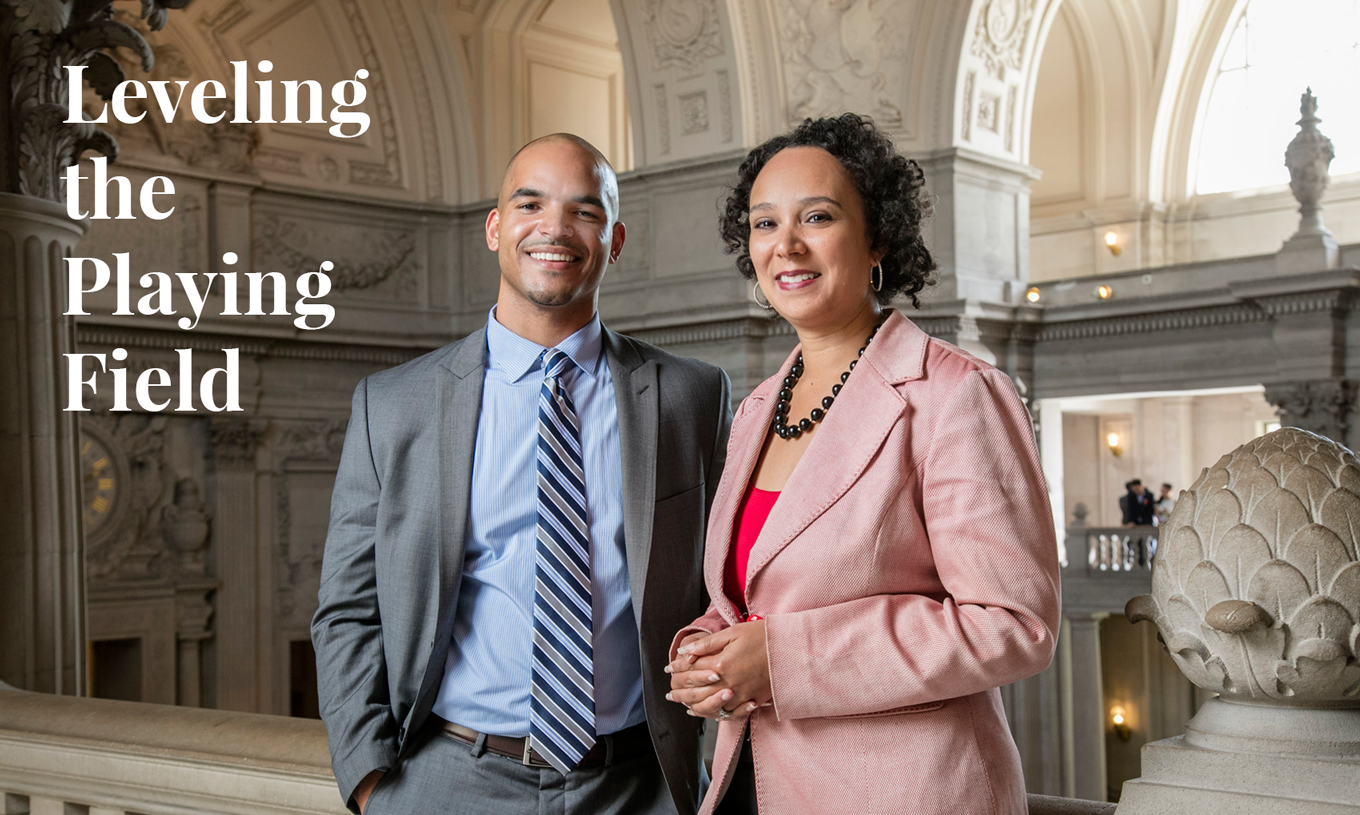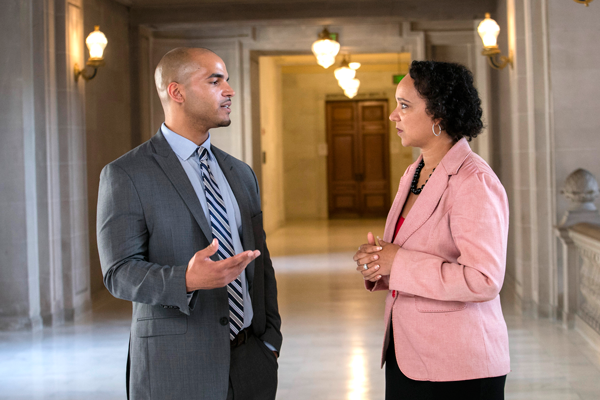Leveling the Playing Field: The Willie L. Brown, Jr. Fellowship

Jared Walker (left) and Naomi Kelly in San Francisco City Hall
The Willie L. Brown, Jr. Fellowship offers public-sector opportunities to students who have overcome obstacles
With its gilded dome, grand staircase and formally dressed wedding couples posing for photos that will last a lifetime, San Francisco City Hall is a character in every story that plays out there. Jared Walker remembers when it entered his life: on the first day of his internship with the Office of the City Administrator as a Willie Brown Fellow. “When I first walked in there I was like…” — he takes a deep breath and exhales with a whoa — “I felt like this was a big chapter coming up.”
That chapter was a semester-long internship handpicked for Walker based on his career ambition to become a city manager. The Willie L. Brown, Jr. Fellowship connects talented, public-service-interested individuals like Walker — specifically, students who face barriers to opportunity — with public-sector internships, a $3,000 stipend and a support system to guide them.
Walker, a finance major who graduated this spring with a GPA just shy of 4.0, came to SF State through Project Rebound, a program that helps ex-offenders succeed on campus — he served three years in prison. He is one of 52 Willie Brown Fellows who have been placed in city and county government internships around the Bay Area, according to Raquel Pinderhughes, the fellowship director and a professor in Urban Studies and Planning in the School of Public Affairs & Civic Engagement, where the fellowship program is housed.
Support includes a weekly three-hour professional development seminar led by Pinderhughes. “The focus is on identifying professional strengths and weaknesses, preparing for informational interviews, written and oral communication, résumés, cover letters and discussing the issues that the students face in their internships,” she says. This includes ongoing counseling and mentorship for current and past fellows.
Partners at the City
And when Pinderhughes reaches out to people like City Administrator Naomi Kelly to place fellows, the answer is yes. That’s the original vision for the program, which Willie L. Brown, Jr. (B.A., ’55), the former mayor of San Francisco and former California State Assembly speaker, started in 2008. Pinderhughes works with seasoned city and county officials to find each fellow a position that directly facilitates his or her career aspiration, a laborious behind-the-scenes matching process she calls “the real secret behind our success.”
For City Administrator Kelly, mentorship is personal — Brown hired her right out of college, encouraged her to go to law school and guided her career as she moved through the ranks at the City. Her office regularly welcomes interns from throughout San Francisco’s neighborhoods. “If they want to come and work with me in the City Administrator’s Office and have an interest in public service, then I open up my doors.”
Walker is her office’s first Willie Brown Fellow. She ticks off some of the disjointed to-do list they exposed him to: measuring performance for animal care and control; developing policy to address the out-migration of African-Americans; evaluating software that measures the efficiency of the city’s fleets; working with different divisions on their budgets. “The array of topics he was able to touch on is kind of exciting,” she says.
Walking through the building’s Doric-column-lined corridors, Walker anticipated a weighty-sounding topic for his main project, so he was surprised to find that his work would focus on puppies and kittens. He soon learned that city management involves all facets of urban life — even ones with cute, furry faces. Working under Kelly’s budget and planning director Adam Nguyen, Walker analyzed a proposed change to the city’s animal vaccination schedule.
Nguyen says doing analyst work has enormous value for a future manager. “How many times do we vaccinate, what are the best practices, what are other municipalities doing around this? Then doing a cost-benefit analysis… and what are the tradeoffs and considerations along the way?” Gathering and assessing such facts yourself, he says, helps you to determine whether the information others present to you “is valid—if they’ve asked the right questions, if they have the information they need” to inform policy and operations-management decisions.
City managers pivot topics every hour or less, Kelly adds, so sharp analytical skills are important. “You’ve got to be able to think fast and on your feet.”
Nguyen also taught Walker that strong teamwork skills can make government more efficient. “Every step he showed me, ‘Now look, if you do this, you’re making it easier for the next person who has to pick this up and make something happen with this project,’” Walker recalls.
In addition to his project, he shadowed Kelly and others to a range of meetings, from listening to the mayor and department heads wrestle with public policy issues to reviewing purchase orders with division-based analysts. The internship, including the most challenging parts, strengthened Walker’s resolve to become a city manager.

Metrics of success
Based on the program’s success rate, his odds look good. All former fellows are either employed, applying to graduate or law school, or in a postgraduate program, Pinderhughes says.
And she doesn’t limit the definition of success to public-sector jobs. One former fellow is an English Language teacher for new immigrants. Another helps secure loans for low-income housing. “Even students with jobs outside the public sector are doing work that serves communities in meaningful ways,” she says, proud of the program’s already considerable impact.
A dedicated network
The program is open to all SF State students, but the majority of applicants in the past year came from the College of Health and Social Sciences (CHSS), the program’s academic home. “Majors in CHSS are very directed to serving some of the critical needs in the city… public health, urban planning, housing, transportation, criminal justice reform, management,” Pinderhughes says. “They are well trained, their applications are strong, and their career goals are well defined.”
Something else the Willie Brown Fellows have in common is access to opportunities they wouldn’t ordinarily come by, including a network of influential people rooting for them to succeed. Supporters are dedicated because of their respect and affection for Willie Brown — and equally, Pinderhughes says, a deep belief in the program’s mission. “They are truly committed to the shared goal of getting people from diverse communities into positions of decision-making and power so that we can have representative government and services,” she says.
Naomi Kelly thinks cultivating such opportunity is just good governance. “The more diverse opinions you have around the table, the better your policy will be,” she says. “You need to have multiple insights into cultural differences.
Walker, who plans to get more work experience and then pursue an M.B.A., grasps the value of the doors being opened for him and his fellowship colleagues. “I think people are sometimes are written off — people just assume that you don’t have anything to offer because of what you’ve been through or where you come from. It’s all working against you,” he says. He calls the Willie Brown Fellowship and its many supporters “a counterbalance” to such routine prejudices. “This gives you the opportunity to show: That’s your past. What are you capable of now? What do you want your future to be like?”
Tags